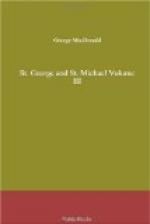And again she turned to go.
‘Dorothy!’ cried the youth, turning pale with agony to find on the brink of what an abyss of loss his zeal had set him, ’wilt thou, then, never speak to me more, and I love thee as the daylight?’
’Never more till thou repent and turn. I will but give thee one piece of counsel, and then leave thee—if for ever, that rests with thee. There has lately appeared, like the frog out of the mouth of the dragon, a certain tractate or treatise, small in bulk, but large with the wind of evil doctrine. Doubtless it will reach your father’s house ere long, if it be not, as is more likely, already there, for it is the vile work of one they call a puritan, though where even the writer can vainly imagine the purity of such work to lie, let the pamphlet itself raise the question. Read the evil thing—or, I will not say read it, but glance the eye over it. It is styled “Animadversions upon—.” Truly, I cannot recall the long-drawn title. It is filled, even as a toad with poison, so full of evil and scurrilous sayings against good men, rating and abusing them as the very off-scouring of the earth, that you cannot yet be so far gone in evil as not to be reclaimed by seeing whither such men and their inspiration would lead you. Farewell, Richard.’
With the words, and without a look, Dorothy, who had been standing sideways in act to go, swept up the pleached alley, her step so stately and her head so high that Richard, slowly as she walked away, dared not follow her, but stood ‘like one forbid.’ When she had vanished, and the light shone in full at the far end, he gave a great sigh and turned away, and the old dial was forsaken.
The scrap of title Dorothy had given was enough to enable Richard to recognise the pamphlet as one a copy of which his father had received only a few days before, and over the reading of which they had again and again laughed unrestrainedly. As he walked home he sought in vain to recall anything in it deserving of such reprobation as Dorothy had branded it withal. Had it been written on the other side no search would have been necessary, for party spirit (from which how could such a youth be free, when the greatest men of his time were deeply tainted?), while it blinds the eyes in one direction, makes them doubly keen in another. As it was, the abuse in the pamphlet referred to, appeared to him only warrantable indignation; and, the arrogance of an imperfect love leading him to utter desertion of his newly-adopted principles, he scorned as presumptuous that exercise of her own judgment on the part of Dorothy which had led to their separation, bitterly resenting the change in his playmate, who, now an angry woman, had decreed his degradation from the commonest privileges of friendship, until such time as he should abjure his convictions, become a renegade to the truth, and abandon the hope of resulting freedom which the strife of parties held out—an act of tyranny the reflection upon which raised such




